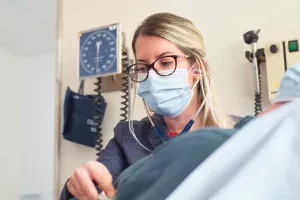Cardiac sarcoidosis is a rare immune system disease where cells form into clumps (known as granulomas) in the heart. These granulomas cause inflammation and can weaken the body’s electrical system that controls your heartbeat.
Restoring your body’s ability to protect itself
The immune system is your body’s first line of defense against diseases and infections. When you’re sick or living with certain conditions, your immune system produces white blood cells to help your body fight unwanted, harmful substances.
Sometimes, the body overproduces white blood cells. When this happens, these extra white blood cells accumulate on and inflame the organs and tissues they usually protect. This is called sarcoidosis, and when it affects the heart, it's called cardiac sarcoidosis.
While there isn't a cure for cardiac sarcoidosis yet, there are steps we can take to reduce inflammation and alleviate symptoms. Because when you turn to Tufts Medicine, comfort and wellness are at the heart of your care plan.

Conditions
The cause of cardiac sarcoidosis is currently unknown. Some researchers suspect that it’s caused by exposure to certain biological contaminants, like mold, pesticides or other bacteria.
Cardiac sarcoidosis symptoms present themselves in a similar way to other heart conditions, like heart failure or a heart attack. As always, if you believe you're facing a medical emergency, call 911 immediately.
If you’re experiencing any of the following symptoms, it’s important to contact your doctor as soon as possible:
- Dizziness
- Fainting
- Fluid buildup in the legs, ankles and feet
- Shortness of breath
The underlying reason for these symptoms can be:
- A block in the electrical conduction of the heart
- A fast electrical rhythm called ventricular tachycardia
- Weakness of heart pumping function
Testing
Since cardiac sarcoidosis symptoms mirror other heart diseases, we provide thorough testing to detect and diagnose what you’re living with.
One particularly effective test is the myocardial FDG/PET scan. It’s a type of scan that uses a small amount of radioactive material to help get a clear image of the heart and where it's inflamed. We use myocardial FDG/PET scans to both diagnose cardiac sarcoidosis and to monitor your response to treatment.
We may pair a myocardial FDG/PET scan with other important heart tests, including a:
- Cardiac MRI scan
- Echocardiogram
- Electrocardiogram
- Heart rhythm monitor
Your doctor may order occasional blood testing to monitor your organ health. Sometimes, we’ll biopsy (take a small piece of tissue for analysis) an enlarged lymph node or sample of heart tissue to confirm if you're living with cardiac sarcoidosis.
Treatments
It takes a village of experts to treat cardiac sarcoidosis. Here at Tufts Medicine, that village includes our experts in rheumatology, electrophysiology, heart failure and pulmonology.
Our top treatment priority is to reduce inflammation before it causes serious heart damage. For some people, that inflammation goes away on its own without treatment. And for others with persistent inflammation, we'll factor in your health history, personal goals and level of inflammation when charting a treatment course.
Treatment options can include the following medications:
- Intravenous infusions such as infliximab (also known as Remicaide®)
- Methotrexate (a chemotherapy drug)
- Steroids (such as prednisone)

From regular office visits to inpatient stays, find the healthcare you need and deserve close to home.

Meet the doctors and care team devoted to supporting you every step of the way along your path to better health.